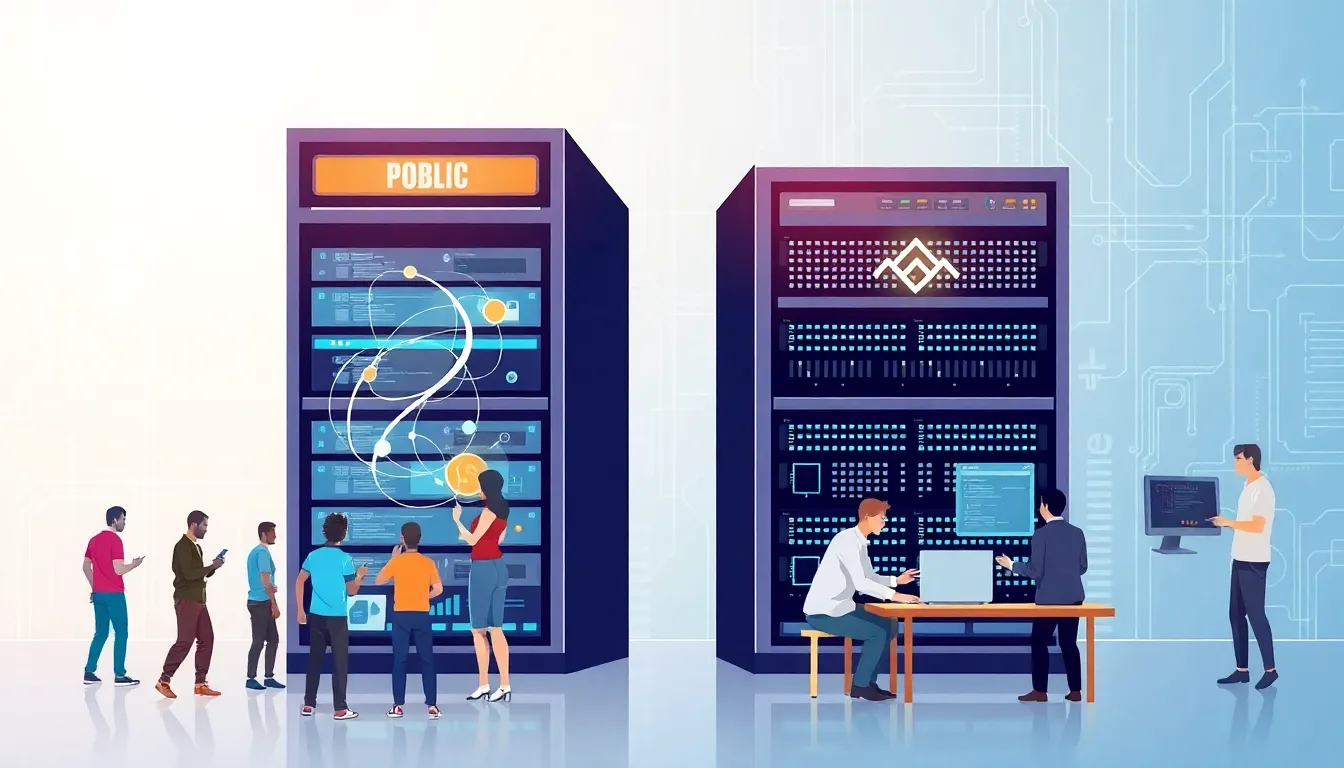In the digital age, where data is the new oil, blockchain servers are the unsung heroes powering the decentralized revolution. Imagine a world where trust is built into the very fabric of technology, and transactions happen faster than you can say “cryptocurrency.” That’s the magic of blockchain servers, working tirelessly behind the scenes to keep everything running smoothly.
These high-tech marvels don’t just store data; they create an unbreakable chain of trust, ensuring security and transparency like never before. Whether it’s for financial transactions or supply chain management, blockchain servers are the secret sauce that makes everything more efficient. So, if you thought servers were just boring boxes in a data center, think again! Dive into the world of blockchain servers and discover how they’re reshaping the future, one block at a time.
Table of Contents
ToggleWhat Are Blockchain Servers?
Blockchain servers are specialized systems designed to facilitate the operations of blockchain networks. They store, process, and secure transactions in a decentralized manner. By maintaining copies of the blockchain, these servers ensure that data is accessible and synchronized across all participants.
Each server in a blockchain network contributes to the overall health and security of the system. Data integrity is paramount, and these servers use cryptographic techniques to achieve it. This methodology creates a chain of trust among users, ensuring that transactions remain transparent and tamper-proof.
Organizations deploy blockchain servers to enhance efficiency in multiple applications. Financial institutions rely on them for secure transactions. Supply chain entities utilize these servers to track goods throughout delivery processes. Each implementation showcases how blockchain technology expands operational capabilities.
In addition to transactional processes, blockchain servers support smart contracts. They execute code automatically when predefined conditions are met. Such functionality streamlines operations across various sectors, from finance to real estate.
Scalability remains a key consideration for blockchain servers. As networks grow, they must accommodate higher transaction volumes without compromising performance. Solutions like sharding and layer two protocols aim to address these challenges.
Overall, blockchain servers are foundational to the success of decentralized applications. Their role extends beyond mere data storage; they enable groundbreaking innovations across industries. By leveraging these servers, enterprises can transform their approaches to data management and security.
Types of Blockchain Servers

Blockchain servers can be categorized into two main types: public and private. Each type serves distinct purposes and comes with its unique features.
Public Blockchain Servers
Public blockchain servers operate on open networks. Any participant can join, and anyone can access the data stored on these servers. Bitcoin and Ethereum exemplify public blockchains, utilizing these servers to ensure transparency and security for all transactions. They facilitate decentralized operations, enabling users to validate transactions without relying on intermediaries. As a result, public servers help in building trust among all users, allowing for a wide range of applications, including cryptocurrency exchanges and decentralized finance platforms. Participants contribute to the network by validating transactions through mining, reinforcing the decentralized nature of public blockchains.
Private Blockchain Servers
Private blockchain servers function within closed networks, restricting access to authorized participants only. Organizations often deploy them to maintain control over their data while enjoying the benefits of blockchain technology. Hyperledger Fabric and R3 Corda are popular examples of private blockchains, offering tailored solutions for enterprises. By allowing selected users to participate, these servers enhance data privacy and security. In addition, they significantly speed up transaction processing times compared to public servers, making them ideal for businesses requiring efficiency in operations. Also, private blockchain servers support regulatory compliance, ensuring that businesses adhere to industry standards while leveraging the advantages of decentralized systems.
Key Features of Blockchain Servers
Blockchain servers exhibit several key features that enhance their functionality. They excel in three main areas: security, decentralization, and scalability.
Security
Security remains a primary concern for blockchain servers. These systems employ robust cryptographic techniques that protect data integrity and transaction authenticity. Tamper-proof mechanisms ensure that once information is recorded, it cannot be altered without consensus from network participants. Additionally, distributed ledger technology minimizes single points of failure, enhancing resilience against cyberattacks. By maintaining multiple copies of the blockchain, these servers guarantee data redundancy, supporting business continuity even if some nodes go offline. This multi-layered security approach fosters trust among users and organizations alike.
Decentralization
Decentralization serves as a cornerstone of blockchain servers. They operate on networks that remove the need for centralized control, allowing a diverse range of participants to access and validate transactions. This structure democratizes decision-making, enabling users to participate without relying on intermediaries. Public blockchain servers exemplify this feature, promoting openness and transparency in operations. Private server models, while restrictive, still support decentralized principles by allowing only authorized users to join. Overall, decentralized architecture contributes to building a resilient and trustworthy system, reinforcing the core values of blockchain technology.
Scalability
Scalability addresses the ability of blockchain servers to handle increasing workloads. As transaction volumes rise, solutions like sharding and layer two protocols come into play. Sharding divides data across multiple servers, optimizing processing efficiency. Layer two solutions facilitate off-chain transactions, reducing congestion on the main blockchain. Many organizations prioritize these strategies to ensure fast and cost-effective transactions. Effective scalability enables seamless growth without sacrificing performance, making blockchain technology more practical for real-world applications. This characteristic is vital for industries needing to manage high transaction throughput, enhancing the adoption of blockchain solutions.
Use Cases of Blockchain Servers
Blockchain servers facilitate various applications across multiple industries. They enhance transparency, security, and efficiency for businesses around the globe.
Financial Services
Financial services leverage blockchain servers to streamline transactions. By facilitating secure peer-to-peer payments, these servers significantly reduce processing times. Additionally, blockchain technology enhances fraud prevention through immutable transaction records. Organizations implementing this technology benefit from lower costs and improved customer trust. Decentralized finance, or DeFi, relies heavily on these servers to provide services such as lending and trading without intermediaries. Many banks explore blockchain integration to innovate their services and maintain competitiveness in the evolving financial landscape.
Supply Chain Management
In supply chain management, blockchain servers provide heightened visibility into product movement. They securely track items from origin to destination, ensuring data integrity throughout the process. Numerous companies utilize this technology to combat counterfeit goods and verify product authenticity. Enhanced transparency allows stakeholders to monitor compliance and mitigate risks effectively. Consequently, partners can respond swiftly to disruptions or delays. Furthermore, these servers foster trust among participants by providing a shared, tamper-proof ledger that documents every transaction.
Healthcare
Healthcare applications utilize blockchain servers to secure patient data. These servers ensure that sensitive information remains confidential while allowing authorized personnel access. Patients can maintain control over their medical records, sharing them selectively with providers. Many healthcare institutions adopt this technology to streamline administrative processes and reduce fraud. Efficient data sharing among healthcare professionals promotes coordinated care and improves patient outcomes. Additionally, blockchain servers offer transparency in drug supply chains, combating counterfeit medications and ensuring patient safety.
Blockchain servers are at the forefront of the digital transformation. Their ability to provide secure and transparent data management is reshaping industries from finance to healthcare. By embracing both public and private blockchain solutions, organizations can enhance efficiency while maintaining control over sensitive information.
The innovative features of blockchain servers, such as decentralization and scalability, ensure they can adapt to growing demands. As businesses increasingly recognize the value of blockchain technology, the potential for groundbreaking applications continues to expand. The future of data management and security lies in the hands of blockchain servers, paving the way for a more efficient and trustworthy digital landscape.




